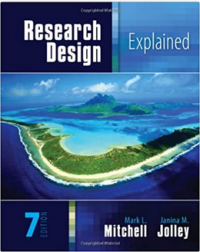
Text
Research Design Explained 7th Edition
This book focuses on two goals: (1) helping students evaluate the internal, external, and construct validity of studies and (2) helping students write a good research proposal. To accomplish these goals, we use the following methods: We use numerous, clear examples—especially for concepts with which students have trouble, such as statistical significance and interactions; We focus on important, fundamental concepts; show students why those concepts are important; relate those concepts to what students already know; and directly attack common misconceptions about those concepts; We show the logic behind the process of research design so that students know more than just terminology—they learn how to think like research psychologists; We explain statistical concepts (not computations) because (a) students seem to have amnesia for what they learned in statistics class, (b) some understanding of statistics is necessary to understand journal articles, and (c) statistics need to be considered before doing research, not afterward. We know that professors share our goals of teaching students to be able to read, evaluate, defend and produce scientific research. We also know that professors differ in how they go about achieving these goals. To accommodate professor differences, we have made chapter relatively self-contained modules. Because each chapter focuses on ethics, construct validity, external validity, and internal validity, it is easy to skip chapters or cover them in different orders. Changes to this edition include chapters as stand-alone modules; providing additional modules on the book's website; integrating the book more closely with its website; and adding more examples from recent journal articles. (PsycINFO Database Record (c) 2016 APA, all rights reserved)
Ketersediaan
Tidak ada salinan data
Informasi Detail
- Judul Seri
-
-
- No. Panggil
-
-
- Penerbit
- USA : Cengage Learning., 2010
- Deskripsi Fisik
-
-
- Bahasa
-
English
- ISBN/ISSN
-
978-0-495-60221-7
- Klasifikasi
-
NONE
- Tipe Isi
-
-
- Tipe Media
-
-
- Tipe Pembawa
-
-
- Edisi
-
7th
- Subjek
-
-
- Info Detail Spesifik
-
-
- Pernyataan Tanggungjawab
-
Mark L. Mitchell, Janina M. Jolley
Versi lain/terkait
Tidak tersedia versi lain
Lampiran Berkas
Komentar
Anda harus masuk sebelum memberikan komentar